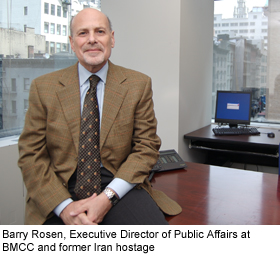
Published with permission of the New York Daily News.
Unlike my own situation 28 years ago, when I, along with 51 other American military and diplomatic officials, was held hostage by Iran for 444 days, the 15 British sailors and Marines captured two weeks ago by Iranian authorities will be released today after quiet diplomacy. Despite Iran’s insistence, the Royal Navy did not apologize. That was the right call. Britain believes that its sailors were 1.7 nautical miles inside Iraqi waters when they were arrested at gunpoint and by force taken to Iran.
But let’s be realistic: The Iranians also will never apologize because it’s not in their political behavior to ever admit they’re wrong. For centuries, the culture has rejected any apology but consistently presents the notion — real or imagined — that it is oppressed by other nations.
While no apology is necessary, diplomacy was the key to the current situation because Britain does not have the moral authority to have escalated the crisis by force, or what Prime Minister Tony Blair called a “different phase,” even though Iran violated the Geneva Conventions by videotaping what are evidently pressured confessions by several sailors. The human rights violations by the United States in Abu Ghraib in Iraq, Guantanamo Bay in Cuba and in Bagram, Afghanistan, have smeared Britain with the same shameful behavior and the Iranians have used that reputation as a weapon to defend itself against coalition forces and to spread its case to the Islamic world and especially the Arab Gulf states via its state-run television station.
The abduction of the sailors was really aimed at the United States, at the West in general, more than Great Britain. Yes, the Iranians shouted “Death to England” in front of the British Embassy in Tehran just days ago, but they are being incited by the domestic political propaganda machine that tells the Iranian people that they are being abused by the “Big Powers” — the United States, Great Britain, Germany, France and sometimes a wavering Russia — and that the Western world is stopping the Islamic state from developing nuclear energy or even possibly a nuclear bomb. The hard-liners in Iran are showing Western leaders that they can make things difficult for them, especially the U.S. and Britain, and this incident is only an example of things to come.
The Iranians milked this crisis for as much as they could get, which might have been an attempt to free five of its embassy people, who are being detained in Iraq by American military forces. Out of the blue, or it seems so, the sixth diplomatic officer, Jalal Sharafi, who was abducted by men in military uniforms on Feb. 4, was suddenly released Tuesday.
While I believe Iran won this propaganda skirmish, it was clear that quiet diplomacy, not politically charged public statements and threats, were key to resolving the crisis. The United States needs to learn from this incident. President Bush should refrain from using tough talk that, in truth, has no teeth. Blair will get himself out of the shadow of Bush by continuing to follow the course of diplomacy that set free the hostages without the harsh rhetoric that the U.S. administration has used to no avail with Iran.
Rosen was the last American press attaché in Iran and is now the spokesman for the Borough of Manhattan Community College of The City University of New York.

